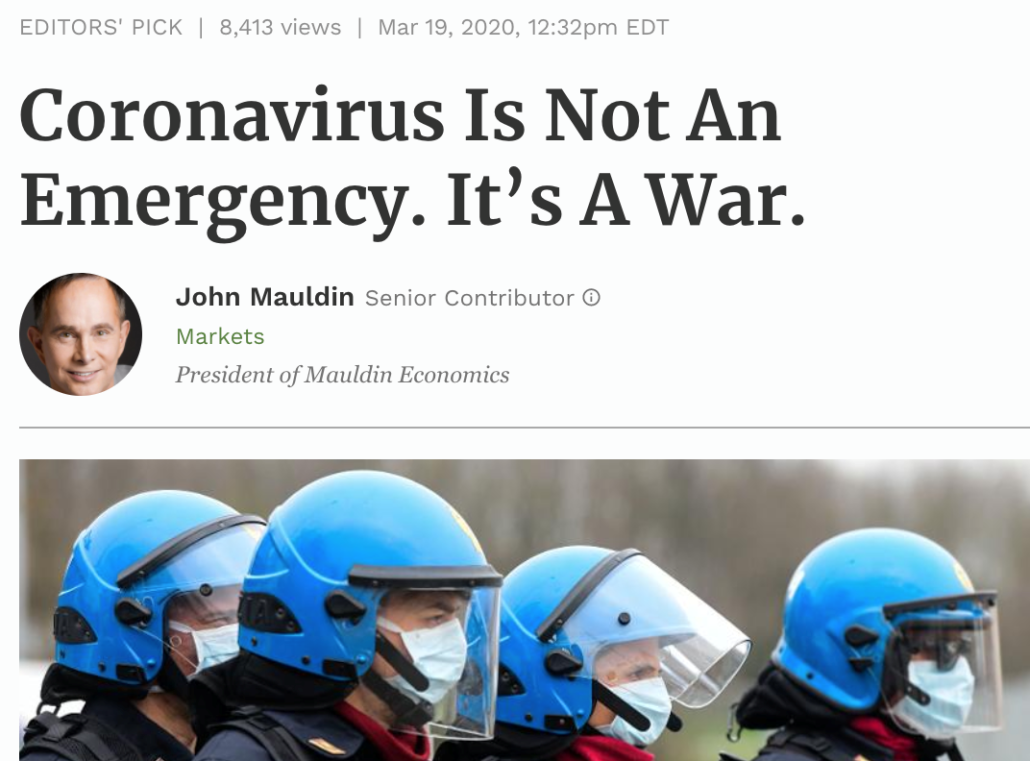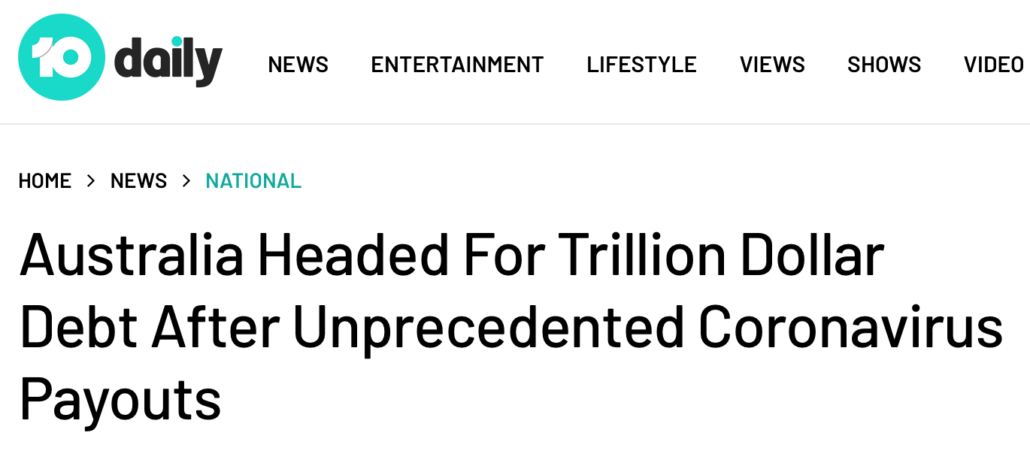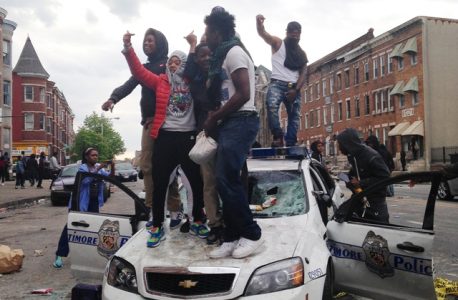By Andrew Joyce for the Occidental Observer
“Promote a sense of collectivism: All messaging should reinforce a sense of community, that ‘we are all in this together.’ This will avoid increasing tensions between different groups.”
Scientific Advisory Group for Emergencies (SAGE)
The above advice was given to the British government in late March, and represents a propaganda strategy designed to stop the flimsy fantasy of multicultural harmony coming apart at its threadbare seams. From a purely strategic point of view, of course, it makes perfect sense. Whether readers believe that the COVID-19 pandemic is a real health crisis or a contrived one, the fact remains that a crisis scenario has been fully realized. Millions are now unemployed, with no immediate prospect of finding new jobs. Many thousands are being taken into hospitals with rapidly diminishing capabilities to treat them. Resources, in terms of jobs, material goods, and services, are becoming scarce. Entire populations have been placed under a kind of house arrest, with some losing their minds and adding their own families to a “string of domestic killings.” A state of emergency now prevails, and the “normal” that we knew isn’t coming back any time soon, and perhaps never will. Multiculturalism, built on the hitherto monolithic foundations of global liberal finance capitalism, and “normalised” by an equally monolithic academic-media complex, is thus subjected to its first “earthquake” from outside the system. One would naturally expect this system to respond by shoring up its more vulnerable structures. And so, I’d been waiting for advice on protecting multiculturalism, like that from SAGE, for about two weeks before it finally arrived. We can be sure it’s been repeated, more or less verbatim, in the halls of every Western government.
In all genuine crises, the superfluous and the artificial within one’s ecology are abandoned quickly. Consult with any survival expert and he will tell you that the core strategy in any survival situation is to strip all activity back to extreme basics — fire, shelter, water, and food. Anything else, any attempt to divert energy into unnecessary rest or leisure, could prove fatal. When societies encounter genuine crises, the same philosophy prevails. Central infrastructure is protected, and superfluous entertainments and distractions are either repurposed as propaganda for the maintenance of morale or dispensed with entirely. The flow of information, outside propaganda, is streamlined to the essential and the relevant. When was the last time you heard about a “Drag Queen Story Hour” or tranny bathrooms? These things were part of our civilisational decline, but they were also merely a form of cultural ephemera produced by a corrupt, rootless cosmopolitanism. To put it in the new language of our times, these things were examples of viral shedding rather than the virus itself. They were the means by which the ideological virus reproduced itself in impressionable or vulgar minds. It may be some time before we are exposed to this kind of ephemera again, which we can applaud and self-congratulate ourselves about, but what about the real virus at the heart of it? What about multiculturalism under coronavirus?
All dissident circles and political outliers have explained lack of success in recent decades by arguing that the false consciousness of the masses, induced by materialism and the saturation of culture with the prevailing ideology, can only be broken by a crisis of global proportions. For the Far Left, this has involved speculation about identifying “emancipatory opportunities” in events such as the migrant crisis, the 2008 financial crash, and the putative future collapse of capitalism itself. Those on the Far Right have equally made gains through crises such as ethnic riots, Muslim terrorism, and wars in Afghanistan and Iraq. It would therefore appear natural, to some extent, to assume that the bigger the crisis, the bigger the possible gains for those outside the mainstream. The assumption would be that a global health emergency ushering in a new Great Depression, would be just what dissidents are looking for. The difficultly thus far, however, is that coronavirus doesn’t seem to be delivering. Why?
Multiculturalism in stasis
Although we are still in the relatively early stages of this outbreak, and a long way from the mass production of a vaccine, the system has taken extremely good care of itself and has demonstrated an extraordinary capacity to absorb and deflect damage. I’m not referring here to medical systems, or to the production and distribution of supplies and equipment, which has been problematic and haphazard. I’m talking about the fundamental governmental and financial structure of how we live our lives. My initial impression is that the tensions induced by multiculturalism and mass migration are now under a kind of situational permafrost. Quite simply, just like its manifestations of viral shedding, multiculturalism has itself been quarantined. If multiculturalism was sustained in the past by a vast network of creeping legal, educational, social, and cultural controls, then it shouldn’t be surprising that it should be held firmly in place at a time when government controls are expanding rapidly.
Multiculturalism is a political and economic problem, but it is primarily social in that it involves direct competition and negative interpersonal interactions between races (social groups). With the introduction of social distancing and forms of mass house arrest, there would be a predictable decline in flashpoints and confrontations. Of course, people still need to exercise, and to procure food and medicines. And, unfortunately, even these meagre opportunities have already provided ample opportunities for Whites to be targeted. In England there have been examples of Muslims and Africans harassing elderly Whites by coughing on them, but the butchering of a seven-year-old English girl, who had been taken on a bike ride through a park by her father, by a Somali immigrant is probably the most horrific recent example. Overall, however, with streets emptying and social gatherings all but eliminated, multiculturalism, along with its symptoms, has been largely sidelined by immediate medical and financial concerns.
This is a valuable lesson for those of us, myself included, who had been convinced in recent years that any kind of serious crisis would prove to be a tipping point in Western consciousness about multiculturalism. Certainly I did not foresee a situation in which multiculturalism could be sequestered within a crisis. And yet it has been. Since the imposition of social distancing measures, crime has plummeted throughout the West. In some areas of the UK, crime has dropped by 20% thanks to the almost complete elimination of snatch-thefts and assaults in public spaces, crimes in which non-Whites feature disproportionately as perpetrators. New York, Chicago, and Los Angeles have witnessed falls in crime of around 25%, with the most marked declines in burglary and assault. Sex crimes have in some areas declined by almost 50%. These falls are almost entirely due to the dramatic reduction, even elimination, of opportunities for such crimes to take place. Whites are safer in their homes than they are in a public saturated with ethnic hostility and criminality. What prevails now is an uneasy peace, a kind of phoney war. Ethnic crime and other forms of interpersonal hostility between the races, something we should unashamedly acknowledge as a propaganda advantage in our confrontation with the broader phenomenon of multiculturalism, is for the time being more or less neutered.
A New False Consciousness
The advice given to the British government by SAGE quite bluntly argues for the manufacturing of a “a sense of collectivism: All messaging should reinforce a sense of community, that ‘we are all in this together.’” This is something that we should all have expected when something like “the crisis” we’d been waiting for finally arrived. That being said, I never imagined it would work. What I have instead observed in the last few weeks is something like the creation of a new false consciousness to mask the cracks in the old one. Yes, economic uncertainty and a daily drumbeat of morbid fear is being disseminated by the mass media. But, for me personally, the more unsettling aspect of what has occurred is the development of a sense of collectivism bred on social media and rooted entirely in fantasy, self-congratulation, and a cloying, ad hoc, insincere, and entirely temporary sentimentality about health workers.
Quite frankly, we aren’t all in this together. Regardless of the insane bathtub ranting of Madonna, the mega-rich have absconded from their city dwellings en masse, in search of private islands replete with “Covid-19 tests abroad, personal medics and subterranean hideouts.” Otherwise normal people have engaged in riotous behavior against one another in order to obtain vast quantities of toilet paper. Competition and tension between nations has increased over access to supplies from China. The old and infirm are more or less at the mercy of younger generations who’ve either failed to take the virus seriously or openly celebrated it as a “Boomer Remover.” Muslims and ultra-Orthodox Jews have proven themselves to be especially prone to spreading infection (see here and here) and dying from COVID-19 (so far, Jews are over-represented in UK deaths by a factor of eight), due to their large families, sometimes with three generations under one roof, and other social habits. Blacks and the disabled have each made the case that they are being uniquely discriminated against in government responses to coronavirus. It’s a psychological free-for-all, and fertile ground for physical disquiet, disguised only by the fact we’re barely allowed out of our homes.
Part of the conditioning of false collectivism is the easily observed widespread employment of the language of warfare. I’ve lost count of the number of times I’ve heard politicians and media figures talk about the “battle” against “the enemy.” Donald Trump has declared he is a “wartime president” against “an invisible enemy.” Emmanuel Macron announced that his country is at war with an “invisible, elusive” enemy. Italy’s special commissioner said the country must equip itself for a “war economy.” Prior to becoming infected and entering intensive care, Boris Johnson announced to his fellow Britons that theirs was a fight in which each and every citizen was “directly enlisted.” Doctors and nurses are said to be on the “front line.” One intention of this nomenclature is probably to reinforce the seriousness of the situation, and to encourage a sense of sacrifice. On the other hand, and more subversively, it’s designed to pacify aggression (by encouraging people to accept their losses as part of a “war effort”), to normalise the expansion of emergency powers and the national security state, and to try to manufacture popular unity by positing a common enemy upon which we are supposed to vent our anxieties and psychological aggression.

The problem is that coronavirus is no more an “enemy” than a bushfire, tornado, or flood. In fact, it’s difficult to imagine an enemy that’s more of a non-entity than a virus, which is really a kind of nonliving, parasitic, reproducing combination of chemicals than a living organism. A virus is a medical puzzle and a clinical complication; it is nothing more. We therefore find ourselves in the grotesque scenario in which Europe’s politicians have dismissed decades of mass migration, casualty-strewn Muslim terrorism, and annual escalations in ethnic crime with mawkish appeals to sentimentality and “coming together,” only to later mobilize the language of war and national defense in a feeble attempt to get us to band together with our new “fellow citizens” on the “front line” against a collection of molecules. They think us fools, and the most tragic aspect of all this is that they are correct.
Mainstream news is awash with propaganda stories (for example, see here, here, and here) of migrant or refugee workers doing “heroic” work in the health system. The Guardian has reported that New Jersey recently became the second state, after New York, “to invoke emergency powers to temporarily relax restrictions on foreign-born medical professionals. … In Germany, hundreds of foreign doctors and nurses who don’t yet have licences to practice signed up to work, following callouts from local authorities who promised training.” Conveniently forgotten is the fact that, for years, foreign medics have been sexually assaulting and abusing their patients in vastly disproportionate numbers. The American Medical Association has called for opening visa processing at embassies and consulates worldwide for physicians seeking to join U.S. residency programs starting in July, meaning sick Americans can very soon look forward to many thousands more examples of the best medical care that Nigeria, Pakistan, and the Middle East have to offer.

You struggle to absorb the sheer stupidity and tragicomedy of the situation, until you recall we are the generation that made Harry Potter and Fifty Shades of Grey the cultural touchstones of our time, simultaneously reflecting our civilization’s newfound penchant for infantile magical thinking and sadomasochism. Faced with a succession of crises, we have perfected our capacity to bewitch ourselves and make them worse.
The Changing Rules of the Game
If the true nature of multiculturalism involves racial competition then we might say, as discussed above, that coronavirus has brought about a pause in play. With quarantine and social distancing, the various teams are locked down in their respective dressing rooms, awaiting further instructions. But what rules will we play under when competition resumes? Already the system has shredded the existing rule book. Every Western nation has introduced massive stimulus packages, some more socialistic than others, in an effort to ensure the corporations can continue to suck profits from a debt-based feeding tube stretching far into the distant future, and to create the illusion that the basic income expectations of their populations are going to be met. Unemployment is soaring, but it remains too early to gauge the level of social disquiet this might give rise to. The point here is that resource competition is being artificially numbed by the debt-based financial system. For now, these measures might help a little. Many people will still be able to make their mortgage payments, buy food, stockpile toilet paper until their instinctive fear is assuaged even a little, and even absorb everything that Netflix and the rest of the entertainment-industrial complex wants to throw at them. They can be made to feel that everything might just work out alright, just like it did in Harry Potter. This infantile sense of hope and expectation is fatal to every revolution, and essential to the maintenance of every status quo. Our people are obedient servants of the state not because they are physically locked down, but because they’re mentally locked down, and have been for decades.
All financial assistance for the average man is being offered on the basis of massive future debt. Everything handed to us now will eventually need to be paid back, and if the sums become high enough, and I believe they already have, that debt will remain for our children and grandchildren. The system is coming to the rescue of itself, even enriching itself, while posturing as saving us. Post-coronavirus, we will once more emerge into the sunshine land of mass migration, low wages, cheap foreign labor, and the meaningless gluttony of consumerism, only this time our taxes will be higher, our children will be poorer, and our governments, staffed with hostile elites, will have more powers of surveillance and coercion than at any time in history. It is here, I think, in the dismal aftermath rather than in the eye of the coronavirus storm, that resource competition will intensify. I hesitate to offer such a theory, for fear that it might be construed as yet another instance of kicking the can of revolution down the road, making of it an event of religious expectation always on the horizon but never coming to fruition. And yet I can’t escape the feeling that no matter what rule changes are brought into the game, when we once more emerge from our homes to resume play there will be less to lose and we will be against an opponent that, if not staggered, will be weakened by having had to redraw its game plan during half-time.

Silver Linings?
Coronavirus may subliminally contribute to a rise in White consciousness, as part of a broader phenomenon in which ethnocentric attitudes increase as a function of perceived disease vulnerability. In its coarser form, it’s fodder for those running on instinct rather than intellect. We saw it in Donald Trump’s reference to the “China virus,” a small number of random assaults of East Asians in several countries, and other examples of anti-Chinese actions. From my own perspective, I’ve found such baiting of the Chinese to be crass and ultimately counter-productive. On a personal level, I feel a sense of revulsion for much of East Asian culture, and I can think of many reasons for an anti-Chinese, anti-Asian stance among Whites that do not involve viewing these people as harbingers of a plague. I view the East Asians as no less a negative force within multiculturalism than any other foreign group, with the exception of the Jews, who are probably finding all of the recent events very unsettling indeed — especially when it emerged that Italian crematoria, with the most modern equipment available, were struggling to cremate any more than 25 bodies a day. But I digress.
The East Asians are a largely silent problem, who bring with them a more subtle form of criminality, and who allow themselves to be used as models of multicultural success. They have no contribution to make to our culture, and have made little or none in the past. Their ethnocentrism is strong but understated, less flamboyant than that of the Jews and the Arabs but carrying ominous potential when combined with international power. Much of their psychology is totally alien to ours, and their treatment of animals is shocking to the European soul. I have seen videos of dogs in Chinese markets that have made my skin scrawl and my blood boil. The East Asians are a rival to the Europeans; we have never been friends. There should have been a mass ban on the entry of all East Asians at the very moment it became known that there had been an outbreak of a novel disease in a Chinese city, and I view any later political rhetoric on the Chinese as a rather late and pathetic attempt at damage-limitation. In other words, I have little patience for GOP lip-service ethnocentrism that begins and ends with mere rhetoric. Hate the Chinese all you want, but if you hate them, hate them with a pure and genuine hatred that is backed with a consideration of all facts on the table.
It’s my sincere and wishful hope that this outbreak contributes to White ethnocentrism by focusing attention on the broader vulnerabilities of porous borders to globalised infection, terrorism, mass migration, and the much deeper transformation of our way of life. I might believe, to borrow the words of Ezra Pound, that our civilization is now little more than an “old bitch gone in the teeth,” but I’m not yet prepared to write it off. When this quarantine ends, we will have to dust ourselves off and once more enter the fray, perhaps with more intensity than ever before. We will have to be adaptive and flexible. In this regard, I find it extremely heartening that Italy has very recently decided to use the coronavirus outbreak to close its ports to all migrant ships, declaring that they “cannot guarantee the requisites needed to be classified and defined as a place of safety.” Genuine concern or exquisite statecraft? Who knows, and who cares? By taking this action, they have turned the very concept of asylum on its head. “Why come to Europe? Europe isn’t safe. Go home.” “Why come to Europe? Europe has no jobs. Go home.” This is the kind of flexible and subtle thinking that will be required moving forward. Opportunities should be sought in every misfortune.
Everything in our nations will become less comfortable in the months and years to come, and some illusions will be dissolved as the situation worsens. Multiculturalism, one of the biggest illusions of our political culture, will eventually suffer. Not right now. Not while social distancing has us all under lockdown. And perhaps not in the immediate aftermath. But it will suffer. The system won’t be able to offer false hopes and false expectations forever. The “sense of collectivism” offered by coronavirus propaganda is a cynical and exploitative ruse that will dissipate as soon as immediate trouble passes. The sense of collectivism we offer is built on tradition, history, blood, and a radical vision of what the future can and must be. It will endure.

